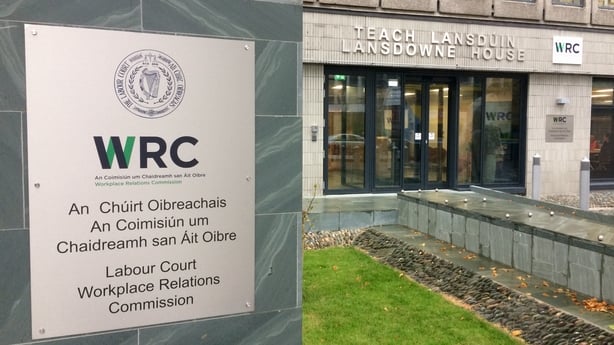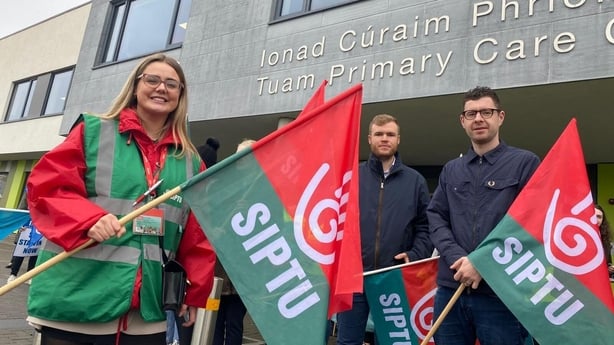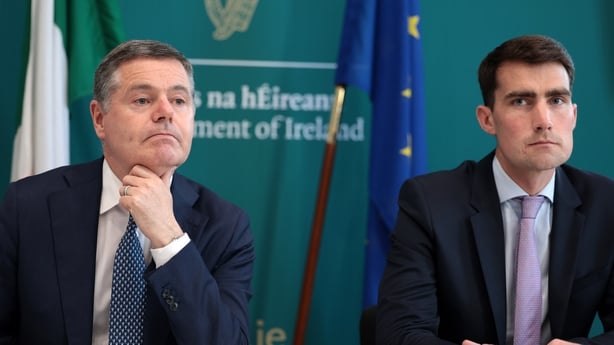A number of Cabinet ministers will be dealing with pressing issues in the areas of work and technology.
There are looming industrial disputes, potential redundancies and demands to tackle business costs.
Ministers will also need to navigate possible clashes between regulators here and US tech companies that have allied themselves with Donald Trump.
Minister for Enterprise, Tourism and Employment Peter Burke
The enterprise and employment elements of Mr Burke's portfolio will be familiar territory for the Longford-Westmeath TD who became Minister for Enterprise, Trade and Employment in April 2024.
That knowledge and experience will be needed as he navigates a number of looming challenges in the area of employment.
Small and medium enterprises (SMEs) are continuing to struggle with rising costs, the most recent of which was an increase in the minimum wage from the start of this month.
Many employers are concerned about the cost of pension auto-enrolment, which is due to begin in September.
There is also uncertainty about further increases to sick pay entitlements. These were due to take effect from 1 January but have been paused pending a review.
"It is a sense of uncertainty that could be the biggest issue for SMEs as they attempt to plan for the year ahead," said Moira Grassick of HR consultancy Peninsula Ireland.
"As businesses continue to tackle increasingly higher costs across the board, many are left wondering what other challenges may lie ahead," Ms Grassick said.
The Programme for Government pledges to assess all elements of labour market policy that impact on the viability of SMEs.
The new Government has said it will recognise the work of the independent Low Pay Commission, ensuring fair wages whilst also supporting the viability of SMEs.
According to the document, the new government will support the central role of the Workplace Relations Commission (WRC) and the Labour Court in industrial relations and employment rights.
It also pledges to promote flexible working arrangements that benefit both workers and employers, ensuring a balanced approach.
The Right to Request Remote Work, which entitles employees to take a case to the WRC if they feel their request has not been handled properly, is due to be reviewed in the coming months.

Remote workers will be hoping that the rules will be strengthened, with critics of the scheme saying it does not do enough to protect and promote remote working.
The Government has pledged to publish an action plan for collective bargaining in 2025 in line with commitments under the EU Directive on Adequate Minimum Wages.
The directive seeks to reduce working poverty and inequality, as well as the promotion of collective bargaining.
Collective bargaining is the process of negotiation between employers and employee representatives such as trade unions.
Unions have accused the Government of not fully implementing the directive by failing to pass new legislation.
Enterprise Ministers get to deliver the good news when companies make big jobs announcements, but they also have to deal with bad news when workers are laid off.
In the last week alone, financial services BNY announced that more than 300 jobs are under threat as it prepares to close its Wexford base.
Facebook parent Meta said it would cut 5% of its global workforce, which is expected to hit Ireland, and Irish-founded payment firm Stripe announced 300 global job cuts with a small number of roles expected to be impacted here.
More jobs cuts could be on the way in the coming years amid efforts by US President Donald Trump to get multinationals to move their operations and profits back to the US.
Aside from navigating potential redundancies in the multinational sector, Mr Burke will also need to balance the concerns of small businesses with the demands of trade unions and low-paid workers who are continuing to struggle with the high cost of living.
Minister for Health Jennifer Carroll MacNeill
Long seen as a rising star within Fine Gael and viewed by some as a potential future Taoiseach, Jennifer Carroll MacNeill will have her hands full in the Department of Health.
Aside from the day-to-day running of the country's health service, she will also have to deal with two looming industrial disputes.
Members of several health unions have voted in favour of industrial action in a dispute over staff shortages.

The Irish Nurses and Midwives Organisation (INMO), Fórsa, Connect, Unite and the Medical Laboratory Scientists Association, are planning their next steps, which could include strike action.
The unions have said that recruitment restrictions and the suppression of posts in the Health Service Executive (HSE) are putting services under enormous strain and are putting patient safety at risk.
The HSE has described the action as regrettable against the background of additional funding for the health service and increasing staff numbers.
Another dispute the minister will have to deal with is a pay row involving Section 39 workers.
Their union SIPTU is to ballot members for strike action and is accusing the Government of failing to honour a pay agreement struck at the Workplace Relations Commission in October 2023.
The deal included a commitment to restore the pay link between the public sector and the community and voluntary sector.
Section 39 organisations are privately owned charities and agencies that are contracted by the State to provide healthcare services.
There is no specific reference to Section 39 workers in the Programme for Government. However, there is a pledge to "work with the voluntary sector through industrial relations mechanisms and other processes to progress pay issues that affect the delivery of disability services and the long-term viability of organisations within the sector."
Minister for Public Expenditure, Infrastructure, Public Services, Reform and Digitalisation Jack Chambers
Jack Chambers will be crossing the corridor to move from the Department of Finance to the neighbouring Department of Public Expenditure.
The close alignment of the two departments, and his working relationship with Paschal Donohoe, who has been appointed as Minister for Finance, should help him navigate the upcoming challenges.
Mr Chambers will be tasked with overseeing public sector reform and the next public sector pay deal which will need to be negotiated next year.

The current deal expires in June 2026. It was agreed last year after what unions described as 'difficult and fraught' negotiations.
But those negotiations happened against a backdrop of big budget surpluses and robust public finances. If the State's coffers are not as healthy this time next year, then Mr Chambers could have to contend with a challenging round of public sector pay talks.
The Programme for Government pledges to continue to focus on a reform agenda in the public service, ensuring that it evolves to meet the needs of modern Ireland.
"This Government will negotiate a new public sector pay deal, linked to a reform agenda, to succeed the existing deal which recognises the central contribution of workers in the delivery of better public services," the programme states.
It also pledges to review the civil service blended working policy framework and to consider how the implementation of this approach best delivers public services and supports the productivity of the public sector.
Blended working allows some civil servants to work from home some of the time. Any efforts to change this system could be met with strong resistance by the public sector unions.
Mr Chambers' role includes a new addition to the brief: Digitalisation.
There are a number of challenges in the technology sector that he and his fellow ministers in departments such as Justice, Media and Communications, will have to contend with.
There could be potential clashes between US tech companies and Irish regulators such as Coimisiún na Meán and the Data Protection Commission.
Many of the tech bosses in the US have aligned themselves with Mr Trump in the hope that he will help them push back against what they view as excessive regulation by the EU.
The Programme for Government contains a pledge to "invest to make Ireland an EU centre of expertise for digital and data regulation".
There is also a commitment to make Ireland "a regulatory hub for companies operating across the EU Digital Single Market".
When it comes to online safety, the programme contains a commitment to tackle controversial recommender algorithms that push harmful content into the feeds of social media users.
It pledges to examine ways to enforce age verification obligations on online service providers and hold them to account for failure to do so.
There is a promise to "recognise the central role data centres play in contributing to economic growth and the enterprise economy, and ensure efficient grid usage, and that waste heat capture for district heating systems and other uses is prioritised."
There is also a commitment to deliver a new National Cybersecurity Strategy in 2025 and promote a centre of excellence for cyber security skills.
Minister for Climate, Environment, Energy and Transport Darragh O'Brien
Darragh O'Brien will be used to navigating a busy portfolio after his time as Minister for Housing.
The climate and environment elements of his brief will occupy a lot of his time, but trade unions will be closely watching how, as Minister for Transport, he delivers on a Government promise to create a new 'transport security force' under the National Transport Authority.
It will have similar powers to the Airport Police and customs officers.
The National Bus and Rail Union (NBRU) and SIPTU have long called for the establishment of such a force to tackle rising assaults and abusive behaviour directed at their members.
Both unions have welcomed the establishment of the security force but have expressed concerns about its implementation and operation.
They have sought meetings with the new Minister to discuss how he plans to make public transport safer for staff and passengers.







